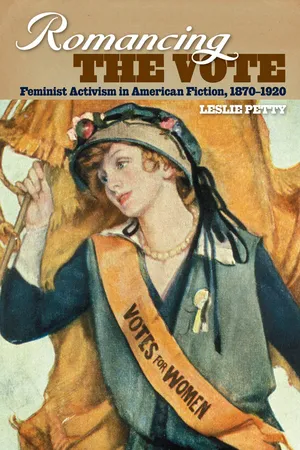
- 240 pages
- English
- PDF
- Available on iOS & Android
About this book
As the nineteenth century progressed into the twentieth, novels about politically active women became increasingly common. Until now, however, no one has studied this body of writing as a distinct tradition in American literature. In Romancing the Vote, Leslie Petty recovers this tradition and also examines how the fiction written about the women's rights and related movements contributed to the creation and continued vitality of those movements.
Petty examines the novels as paradigms of feminist activism and reform communities and elucidates how they, whether wittingly or not, model ways to create similar communities in the real world. She demonstrates how the narratives provide insight into the hopes and anxieties surrounding some of the most important political movements in American history and how they encapsulate the movements' paradoxical blend of progressive and conservative ideologies.
The major works discussed are Elizabeth Boynton Harbert's Out of Her Sphere (1871), Lillie Devereux Blake's Fettered for Life (1874), Henry James's The Bostonians (1886), Frances Ellen Watkins Harper's Iola Leroy (1892), Hamlin Garland's A Spoil of Office (1892), Marjorie Shuler's For Rent—One Pedestal (1917), Elizabeth Jordan's edited volume The Sturdy Oak (1917), and Oreola Williams Haskell's Banner Bearers: Tales of the Suffrage Campaigns (1920).
Although these works discredit many traditional notions about gender and inspire their readers to seek fairness and equality for many American women, they often simultaneously perpetuate discriminatory ideas about other marginalized groups. They not only privilege the experiences of white women but also rely on widespread anxieties about racial and ethnic minorities to demonstrate the need for gender reform. By focusing on such tensions between conventional and unconventional ideas about gender, race, and class, Petty shows how the fiction of this period helps to situate first-wave feminism within a larger historical and cultural context.
Frequently asked questions
- Essential is ideal for learners and professionals who enjoy exploring a wide range of subjects. Access the Essential Library with 800,000+ trusted titles and best-sellers across business, personal growth, and the humanities. Includes unlimited reading time and Standard Read Aloud voice.
- Complete: Perfect for advanced learners and researchers needing full, unrestricted access. Unlock 1.4M+ books across hundreds of subjects, including academic and specialized titles. The Complete Plan also includes advanced features like Premium Read Aloud and Research Assistant.
Please note we cannot support devices running on iOS 13 and Android 7 or earlier. Learn more about using the app.
Information
Table of contents
- Cover
- Contents
- Acknowledgments
- Introduction
- CHAPTER ONE: “True Christian Philanthropy”; or, a Release from the “Prison-House” of Marriage: Fictional Representations of Feminist Activism in the 1870s
- CHAPTER TWO: Expanding the Vision of Feminist Activism: Frances E.W. Harper’s Iola Leroy and Hamlin Garland’s A Spoil of Office
- CHAPTER THREE: Making It New: Middlebrow Literary Culture and Twentieth-Century Suffrage Fiction
- CHAPTER FOUR: The Political Is Personal: What Henry James’s The Bostonians Can Teach Feminist Activists
- Coda
- Notes
- Bibliography
- Index